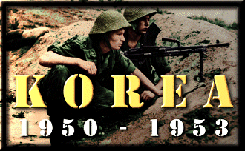A Hill in Korea
Pakchon November 1950
The page is dedicated to the memory of Brigadier A D R G Wilson CBE and John Meighan.
Brigadier David Wilson, known affectionately as 'Chuckles', died at approximately 2030 hrs on Monday 12th November 2001, in hospital in Tunbridge Wells. Chuckles was well respected by all Argyll Korean vets. In 1950 he commanded 'A' Company 1st Argyll and Sutherland Highlanders and lead the company at the battle of Pakchon. Some time ago the Brigadier kindly allowed us to publish his account of the battle ' A Sleeping Bag from Pakchon" on this web site. Brigadier Wilson had recently produced a book 'The Sum of Things' which was the tale of episodes in his long and eventful life.
'I had the great honour of meeting John Meighan a few years ago while attending the regimental reunion. John was delight to talk to and impressed on me the fact that be very much wanted to meet Chick Charlesworth again and thank him personally. Sadly Chick Charlesworth also passed away. All these heroes are greatly missed'.
Martin Spirit.
On the 5th of November 1950 'A' Company 1st Argyll and Sutherland Highlanders commanded by Major "Chuckles " Wilson, now Brigadier Wilson, were ordered by the Battalion's CO Colonel Neilson, to advance and clear what was thought to be a small group of enemy soldiers that had infiltrated between 'A' Company's position and the rest of the 27th Commonwealth Brigade further north in the Pakchon area. 'A' company advanced up the road towards the sounds of battle. What happened next is told below in the stories of four men who were there. Brigadier David Wilson 1st A&SH, Lieutenant (now Brigadier) Chick Charlesworth RAR, Pte Eric Gurr A&SH and Pte John Meighan A&SH. It is a story of great determination, survival and reunion of old soldiers. We start with Brigadier Wilson's account of what happened taken from an article he wrote for the regimental magazine 'The Thin Red Line'
A Sleeping Bag from Pakchon Brigadier A D R G Wilson CBE.
It is getting a bit tatty now and it sheds its feathers through countless holes, badly patched up, but it is still useable to the distress of many friends in yachts and caravans where it is pressed into use from time to time. Like its owner it is long past its 'Sell By' date, but it has a tale or two to tell...

Winter comes quickly in North Korea and November 1950 was no exception. By the first weeks the paddy fields were frozen hard and there was a white rime on the roads and foliage. For those of us in the 27th Brigade who had no proper winter clothing (as we had originally only been sent to Hong Kong for a few months) it was getting bloody cold! In those days the British Army's idea of a sleeping bag, which we had then, was two ordinary blankets sewn together with a bit of tape to tie yourself and your shivers in. Those lovely airborne sleeping bags we had had four years before in Palestine had some how never reached the Far East. So on Sunday the 5th of November 1950, I woke up to the 'First Light Stand To' with my teeth chattering like castanets and frozen toes and fingers to go round my Company of Jocks who were in like condition, but then the rum came round and we revived. Well, sort of.
In cricketing terms A Company, 1st Battalion Argyll and Sutherland Highlanders was acting as a sort of longstop to the 27th Commonwealth Brigade. We were on our own by the side of the Taeryoung River, guarding its crossing south and also a detachment of the 7th Cavalry Division a battery of artillery and a few tanks, all commanded by a young Major. Behind us was a much larger river, the Chongchon.
The rest of the 27th Brigade, the Middlesex and 3RAR were some ten to twelve miles north of A Company, with the remainder of the Argylls, B and C Companies guarding the east bank of Taeryong. Parallel to the Taeryong was a road running north to a small town called Taechon and what had been a main line railway from Pyongyang to Chongju and the Manchurian border some 40 miles northwest. Communications, as usual, were somewhat scrappy. I was, sort of, in touch with Battalion, who were also sort of, in touch with Brigade.
The war had changed a bit in the previous seventy-two hours. Up until then we had been pursuing a defeated North Korean Army, which could man a few rearguard actions or two, but this was gradually disintegrating. A strange new menace had appeared from Manchuria - the Chinese. We hadn't actually seen any ourselves but there were rumours and stories, and we had heard the two battalions of the 8th US Cavalry had been seriously attacked at a place called Unsan, some 30 miles away and had to withdraw in some disorder. There was a smell of uncertainty in the air, and that was disturbing. But we in the 27th Brigade reckoned we could handle any nonsense that might occur, and so we did, but it was near thing.
When I was wandering round our positions, I could see in the distance what looked like smoke shells exploding on the frozen paddy fields, between us and where the rest of the Battalion was. But there was no sound of gunfire and I couldn't hear anything on the wireless.
Gunfire is strange; some times you can hear it many miles away, sometimes the sound goes elsewhere and perhaps over your head. Anyway, or so I thought, there was nothing to worry about and as I'd been asked to have breakfast with the American Battery I walked down the hill to their lines to be given a large plate of hot cakes, bacon and maple syrup. (The US Army is pretty good at dishing up breakfast under all sorts of conditions). But I had hardly stuck into mine when the Captain commanding the small tank detachment came rushing up to me and said that my CO wanted me urgently on his tank set.
Leslie Neilson, my CO was very agitated. Someone had infiltrated a large force between him and me, and I was to take everyone I could and clear the roadblock immediately. He and the rest of the Battalion were going to have to re-cross the Taeryong and do what they could. I was to attack the roadblock from the south but I had to leave one platoon behind in my present area to guard the US detachment. He didn't know where the roadblock was or how strong. If I couldn't clear it the Brigade could be cut off!

It was a pity about the breakfast. I swallowed the last mouth full and mobilized the Jocks. I could only take two of my platoons, two 3-inch mortars and my section of two Vickers MMGs. I persuaded four of the American tanks to come with me, and with one platoon on them and the remainder in trucks we drove north up the road for about three miles, or perhaps a little more, to come across a most astonishing sight.
Unknown to us, C Battery of the 61st Artillery Battalion 1st Cavalry Division had moved into a harbour area during the night. As dawn broke they were attacked by a considerable force of Chinese who were making for a small bridge which they intended to destroy, but their commander, Captain Howard M. Moore, formed his six guns into a semicircle and engaged the enemy over open sights at almost point blank range. In olden days he would have had what was called 'canister", but instead he depressed his guns so that his shells bounced off the frozen paddy and exploded in the enemies faces. As we arrived we could see his gunners being shot up behind their gun shields, while others took their place. It was like seeing something from a war in the Napoleonic Area.

Luckily we arrived in the nick of time. The enemy couldn't face our four tanks and fled while we pursued them, and something rather like a snipe shoot occurred with the Chinese emerging from their hiding places in the paddies and the Jocks and tanks shooting them down. It took us half an hour to clear the paddy, and we moved up to a smallish hill about a thousand yards from the road. When we got to the top we could see more Chinese running away, but they were soon out of range.
And now came the problem. The hill we had secured was really too long a ridge for just one platoon to hold, and I couldn't afford to put my whole force on it. I had no artillery support as C Battery had fired its last shell, and we still no communication with the Battalion. So I left one platoon to hold as best as it could, as there was no enemy in sight then, left Sergeant Clarke, the mortar commander with his radio set with them so he could call down fire and withdrew everyone else back to the road, where with the two Vickers MMGs, we could have a support position. So far so good and it was about nine o'clock in the morning.
Meanwhile to the north of me, Battalion headquarters and B and C Companies were having problems crossing the Taeryong. One company commander was badly wounded and knocked out, communications as usual up the spout, but they did succeed in clearing the obstacle.
At about ten o'clock things started to go wrong in my part of the world. The enemy put in a vicious counter attack on my lone platoon up the hill, and in the first few shots Sergeant Clarke, the mortar commander was killed, and without him our mortars were blind. In the meantime the platoon on the hill had suffered another three killed and six wounded and there was no way they could stay in position, so I told the young platoon commander to get his men off and down to a place where he could hold and be covered by the tanks, mortars and Vickers. This he did but not without some more casualties.

By eleven o'clock we had reached a position of stalemate. The Chinese could sit on the hill provided they didn't show their faces over the top, where they would be murdered by the tanks, mortars and Vickers, but equally we ourselves could go nowhere. Soon we started running out of ammunition! Had the Chinese realized we were sitting ducks ourselves, we would have been overrun but luckily, the wireless started working again and we were able to get a resupply of sorts from Battalion, with exhortations to "hang on" as the whole Brigade was coming. Well, hang on we did, and then about two o'clock our friends of the 3 RAR appeared from the north with Brigade Headquarters, and put in a company attack to regain the hill I had held and lost. By four o'clock they had it. I had gone with them to see how our wounded had fared, and found to my surprise, and this was confirmed later by them later, that the Chinese had done what they could for them, put on what dressings they had, and kept them under shelter. Different conduct from what I remembered from the Japanese Army five years earlier.
I helped carry Corporal Paterson, one of my section commanders, off the hill and back to the road. He was badly wounded but our MO reckoned he would be OK. Lance Corporal Starke, his No. 2, was killed, according to Paterson, trying to get him under cover, Sergeant Clarke and the others were dead.

The whole of the Argylls went back and reoccupied the area where I had been with the US artillery and tanks. The Middlesex and Australians were just north of us where they had an exciting night, and then suddenly nothing. The Chinese had broken contact and withdrawn.
That evening my Company Sergeant Major came to me carrying something, and said he thought I might find it useful. How right he was, it was a proper down filled US Army sleeping bag. It was found in one of the 61 Artillery trucks! I carried it all through Korea, and ever since, to the dismay of friend in boats, caravans and other places. It reminds me of one of the most eventful days I've ever spent anywhere.
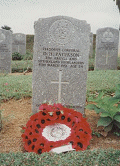
But occasionally other things jog the memory. A while ago I was going around Kranji Cemetery in Singapore, looking for the graves of my friends and contemporaries who died in the W.W.II Malayan Campaign and I came across one stone of a slightly different shape. 14450655 Cpl. D Paterson 4 March 1951. I never knew he died, I thought he made it as I knew he had got to Singapore safely and was recovering. We were in our last month in Korea then, and I suppose news never got to us. There is a bit of silk embroidery on our Regimental Colour, just one word but unique. In the whole British Army we are the only Regiment to bear it, but we share it with our comrade, The Royal Australian Regiment: PAKCHON.
Private Eric Gurr was a rifleman in the ill fated Argyll platoon that advanced up that in on the morning of the 5th. This is his story.
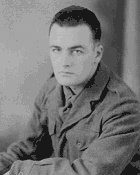
Time has great healing properties. In some people it can dull the pain of reliving horrific experiences. Maybe it will rekindle a smile as you recall a humorous circumstance. As I drift through the haze of time, I recall my time at the sharp end was short, but eventful. Distinctly, I remember re-enlisting in The Black Watch (RHR) on the 30th of May 1950. I was sent to Fort George for basic training and recollect that things had not changed since I left the army two years earlier. At this time the Argyll and Sutherland Highlanders were in combat within Korea. Sadly because of an unfortunate incident on Hill 282, when American aircraft attacked and bombed the Argylls by mistake (which reduced their strength in numbers), so they required more recruits. I was transferred to the 1st Battalion the Argyll and Sutherland Highlanders, and suddenly found myself on a draft heading for Korea.
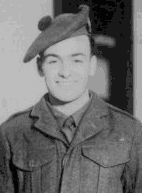
We flew from RAF Lyneham, and arrived in Japan a week later. A week seems a long time for this journey, but we only flew by day, and stayed at military bases overnight. On joining the Battalion in the Pusan perimeter, we laboured to settle in quickly as the Inchon landings had just taken place, and we were required as soon as possible. We flew by Fairchild C-119 Flying Boxcar to Kimpo Airport where, although it was the coldest winter for a decade, we arrived in our jungle greens, as our heavy clothing was still en-route by ship from Hong Kong. The Americans supplied us with wind proof clothing, transport and rations. We advanced up the West Coast through Pyongyang up to the Yalu River, close to the Manchurian border. Here, hopes were raised as General Macarthur intimated again and again, that we would all be home for Christmas. How could he be so wrong? At the end of October there was discouraging news that the Chinese had entered the war. The Chinese pushed hard; we were forced to retreat south. Stopping at Pakchon, we dug in as if for a long stay. However on the Sunday the 5th of November 1st Platoon A Company, were sent to deal with sniping at trucks on the road. It was a bright sunny day and a change from the routine. The hill was low by Korean standards, and having established that there was only one sniper, we took the hill with ease. Unknown to us we had been drawn into a trap.
After taking the hill we sat around for a while and then noticed large numbers of Chinese troops coming alongside the paddy fields below. Immediately, heedful of the situation, firing started and a few of the lads were killed. The order came to evacuate the hill, but on the far side it was not possible, as we were in the line of fire. When the Chinese took the hill, I was kneeling on one knee with my hands on the ground, trying to take cover behind a bush about six inches high. In that circumstance, any panic of lowering of morale would have been disastrous.
The urge to run, to put distance between you and danger is instinctive. In addition to this instinct, are the effects of prolonged stress and accumulation of fear. As all this was running through my mind, the leading Chinese was upon me (I took him to be an officer, although I believe in those days they did not have officers) he fired a burst from his "Burp" gun as he stood over me, most of the bullets going through my legs, and on my thumb. As I fell I was conscious of bugles playing the Banzai. I lay and played dead for what seemed like ages as the firing went on.
I was shot again in the shoulder, and was grazed on the head. I really believed that I would not survive. How long I was unconscious is uncertain. On regaining consciousness I was aware it was much quieter, and a cold feeling that someone was near. A Chinese soldier had decided to search the dead bodies, and pushed me over onto my back with his foot. The game was up. I raised my arms above my head with sheer terror on my face. He made me stand still, (I don't know how I managed to stand) as he emptied my pockets, then strangely put everything back. By sign language he indicated to me to put my hands on top of my head, lie down on my stomach, and keep quiet. How long I lay there I don't know, I was always expecting a bullet through the head, but it never came.
After what seemed to be hours, the shooting restarted and I was hit again this time in the chest with the force of the impact moving me a couple of inches and I was stunned and passed out. Incidentally, the bullet is still there to this day. When I regained consciousness the light was fading and the Australians had retaken the hill.
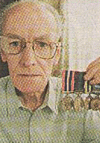
I was flown to the U.S. Hospital in Osaka in Japan, where I spent two weeks. From there I was taken to Kure Hospital in Japan for a period of three weeks. This was followed by a spell in a recuperation camp outside Kure. War seemed a long way off, as I regained my health and strength. Time to reflect, time to think, troubled times when I tried to come to terms with the horror of combat, realizing just how fortunate I was to come through it all. If you had asked for counselling you would have been laughed at, although I did feel traumatized. The camp was more or less emptied as we were returned to our units. On arrival at Battalion HQ we were described by one officer as " skiving so and so's " who had been living it up in Tokyo, a place I have never visited. By a happy chance the MO thought differently in my case. I was sent to Pusan where I finished my war guarding POWs.
As far as I know only three of us came off that hill alive, Cpl. Patterson, John Meighan, and myself - Cpl. Patterson died later in hospital. John Meighan was sent to hospital in Hong Kong to have shrapnel removed, and I presume he was demobbed. I would like to re-establish contact with him and I believe he's staying in the Glasgow area. So ends my little story. God forbid that anyone ever lives to experience the horrors of war again.
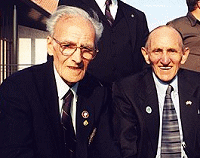
In 1998 Eric placed a message in local newspapers to try and find John Meighan. To his joy John answered his message and after 48 years the two survivors of the battle met up again. One of the web masters of this site (Martin Spirit) was lucky enough to meet both Eric and John at a recent reunion of the 1st Battalion A&SH in May of this year. It was truly an honour to meet these two survivors of that hill in Korea. Martin was able to ask John about what had happened to him on that day. This is John Meighan's story.
Please excuse me if I ramble on a little bit but this is the first chance I've had to talk to anyone at length about my experience...

I arrived in Korea with the first of the British troops being the 1st Battalion Argyll and Southern Highlanders and the Middlesex Regiment. We saw some action quite early on but for now I will concentrate on the 5th of November 1950 Pakchon. It was a cold crisp morning and we in A company were doing what soldiers normally do during lulls that is cleaning weapons and nattering the usual rubbish to each other etc. Suddenly orders came to assemble for a briefing, which was very short as we were told that a group of Australian trucks had been pinned down by enemy gunfire from the hills overlooking the road - on one hill in particular was apparently a serious problem! We were swiftly loaded onto trucks and tanks and transported to near the location of the action where we found that what we had been briefed on was basically correct. There was quite a stretch of open ground between the road and the "Hill". We were given orders to advance over this ground and to take and hold this hill.
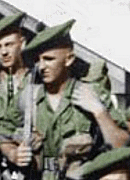
We started meeting enemy opposition on the flat open ground and were being fired on from the hill itself (all this was whilst advancing to the sound of Major Wilson's Hunting Horn). However, we captured the hill and our platoon was designated to hold it as the remainder of A Company had other business to attend to. Naturally we were delighted about achieving out target but our triumph was short lived.
I was in the forward section of the platoon and we soon noticed lots of activity on the flat ground and adjacent hills. But before we could digest this information we came under intense and heavy enemy fire, which in the first instance killed our Bren gun team and destroyed the Bren gun! Pte Eric Gurr and myself were furthest forward of the platoon, that is, on the forward slop of the hill and nearest the enemy who we could plainly see charging towards our position!
Not having heard any gunfire from our own section we decided to make our separate way to a more sheltered position on the other side of the hill. I had gone a little way and we found Cpl. Paterson, L/Cpl. Starke and Johnny Kemp all from our section. All of them were wounded. I attempted to move Cpl. Paterson to a safer position. L/Cpl. Starke was already badly wounded and died soon after singing " God Save The King ". Johnny Kemp died about the same time.
By then the Chinese had arrived. I was still lying on the ground with Cpl. Patterson when the first Chinese reached us. I was on my back, facing upwards with my feet down the slope, which was fortunate because as the Chinese stuck his bayonet into my upper chest I instinctively raised my rife, which was loaded and cocked by my side. I shot him, and because of the position I was in as he fell he withdrew the bayonet from my chest! However the next Chinese soldier shot me in the left wrist. (An Australian surgeon later told me that it was probably a Dum Dum bullet because it shattered the bones in my hand).
At that point I must have passed out because when I came around Chinese soldiers surrounded me and I expected to be killed at any moment. I didn't know how long that I lay there but it seemed like an eternity but finally after lapsing into and out of consciousness I came to and two Aussies were coming towards me. I was afraid they would mistake me for a Chinese and all I could say was: " Jock, Jock, and point to myself. However they recognized me and tried to attend to my wounds but my ordeal was not over. Suddenly from behind them a Chinese appeared with a burp gun aimed at us. He pulled the trigger and all we heard was... Click.... ! I don't know what happened next as I think I blacked out again for a short time.
As John lay there thinking he was about to die he need not have worried for help was on its way in the form of the Royal Australian regiment. The RAR had arrived at the bottom of the hill with the rest of the 27th Brigade. The RAR assaulted the hill to remove the Chinese and try and rescue any wounded Argylls. In command of 3 Platoon A Company was a young Australian Lt. called Chick Charlesworth. This is his version of what happened as reported in the Australian Army Magazine 'Duty First'
The approach was about 500-600 yards across open ground and we took some mortar and MG fire while advancing but with very few casualties. Once we reached the foot of the objective we advanced steadily up the hill with increasing enemy fire but not enough to stop a determined assault. We paused before the crest then rushed over and went to ground. My batman, runner and myself jumped into a hole only to find that it was already occupied by a wounded Argyll from the fighting that morning. He had been shot and bayoneted but was conscious and very happy to see us.
'John takes up the story'
'I came to and found two big Aussies leaning over me. They started to take care of my wounds saying I was going to be OK now and the RAR had re-taken the hill and driven the Chinese off. Words cannot explain how happy I felt as just an hour ago I felt that that day was going to be my last and now I was saved. The two Aussies finished trying to fix my battered body and then decided to take me back down the hill to the aid post. I was so weak with loss of blood that they both had to lift me up out of the hole. But we were not out of the woods yet. As they started to lift me down the hill a Chinese soldier sprung out from nowhere and pointed his machine gun at us. From the frying pan into the fire I thought'.
The appearance of the lone Chinese soldier had taken Chick Charlesworth and his companion by complete surprise and they were unable to aim their weapons at the Chinese solider quick enough. The Chinese brought his gun up and pulled the trigger. "Click" nothing! Either he had run out of ammo or his gun had miss-fired.
Chick remembers, ' Fortunately there was a loud click and he dropped his gun and ran away down the hill. I aimed my rifle to shoot him and would you believe it "Click " again. This time it was my rifle. I hadn't reloaded on coming over the crest. I yelled to the soldier on the left- Claude Scholl as I remember, to get the escaping enemy and I vividly recall one of the soldiers pursuing and prodding him with his bayonet, but he got away. There were a lot of lucky people on that hill that day and a lot of unlucky ones'.
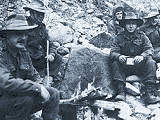
John remained unconscious as he was carried down the hill. Chick stayed on the hill with his platoon who were attacked on and off by the Chinese through out the rest of the day taking heavy causalities from mortar shelling. As darkness came the Aussies were ordered off the hill. The Chinese bugles could be heard as the enemy massed its forces for a huge attack to take back the hill. Chick started to pull back his platoon. As his men passed him he counted them off to make sure no one was left on the hill. When the number of men passing him reached more than 35 (the size of his platoon by then) he realized to his horror that he was counting Chinese soldiers who had tagged on the end of his platoon. Chick shouted a warning to his men. The hill erupted into a renewed firefight. 3 Platoon managed to extract themselves from the hill although Chick was wounded on the way down in the leg and thigh. His men took him to the RAP at the bottom of the hill.
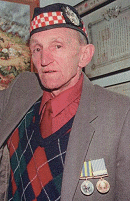
Meanwhile John Meighan had been evacuated with other wounded and was eventually sent to Japan to recover from his terrible wounds. John never had the opportunity to thank the two Australians who had found and cared for him on the hill. In 1997 Brigadier Wilson read an article in the Australian Army magazine "Duty First" The article was written by Chick Charlesworth (now a Brigadier DSC RL) Chick had written about his experiences in the Korea in 1950, particularly the fight for the hill near Pakchon. After reading Chick's story of finding a badly wounded Argyll, Brigadier Wilson put two and two together and realized that Chick was John Meighan's Australian saviour. He sent the article off to John. John was over joyed with the news from Brigadier Wilson and immediately started the ball rolling to try and get in contact with Chick. He soon tracked Chick down to his home in New South Wales Australia and telephoned him.
'Finally after 47 years I was able to thank the guy who saved my life. When I spoke to him on the phone, it was the most emotional moment in my whole life. This guy had put his own life at risk for me. He thought I had died of my terrible wounds and did not have a clue that I was still alive. We both got choked up and for me it was the end to a great mystery'.
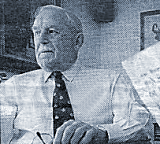
Chick Charlesworth was very surprised to get John's phone call. "At that time in Korea I was a young lieutenant and was just doing my duty. I never even knew the name of the badly wounded Argyll we rescued that day. When John spoke to me on the phone and told me who he was and how much he wanted to thank me, tears welled up in my eyes. I told him that god didn't want him to die that day. John and Chick remain in contact and John hopes to travel to Australia in the near future to say thank you in person to Chick Charlesworth.
We would like to thank all the ex Argylls who helped us compile this page and allowed us to publish thier stories. We would like to give a special mention to Mr. Ray Vearnals from Cheshire. Ray served with the 1st Battalion from 1945 to 1952 in Palestine and Korea with 'A' Company's HQ Platoon. Ray has always been a very active member of the Manchester branch of the Argyll and Sutherland Highlanders Regimental Association.

